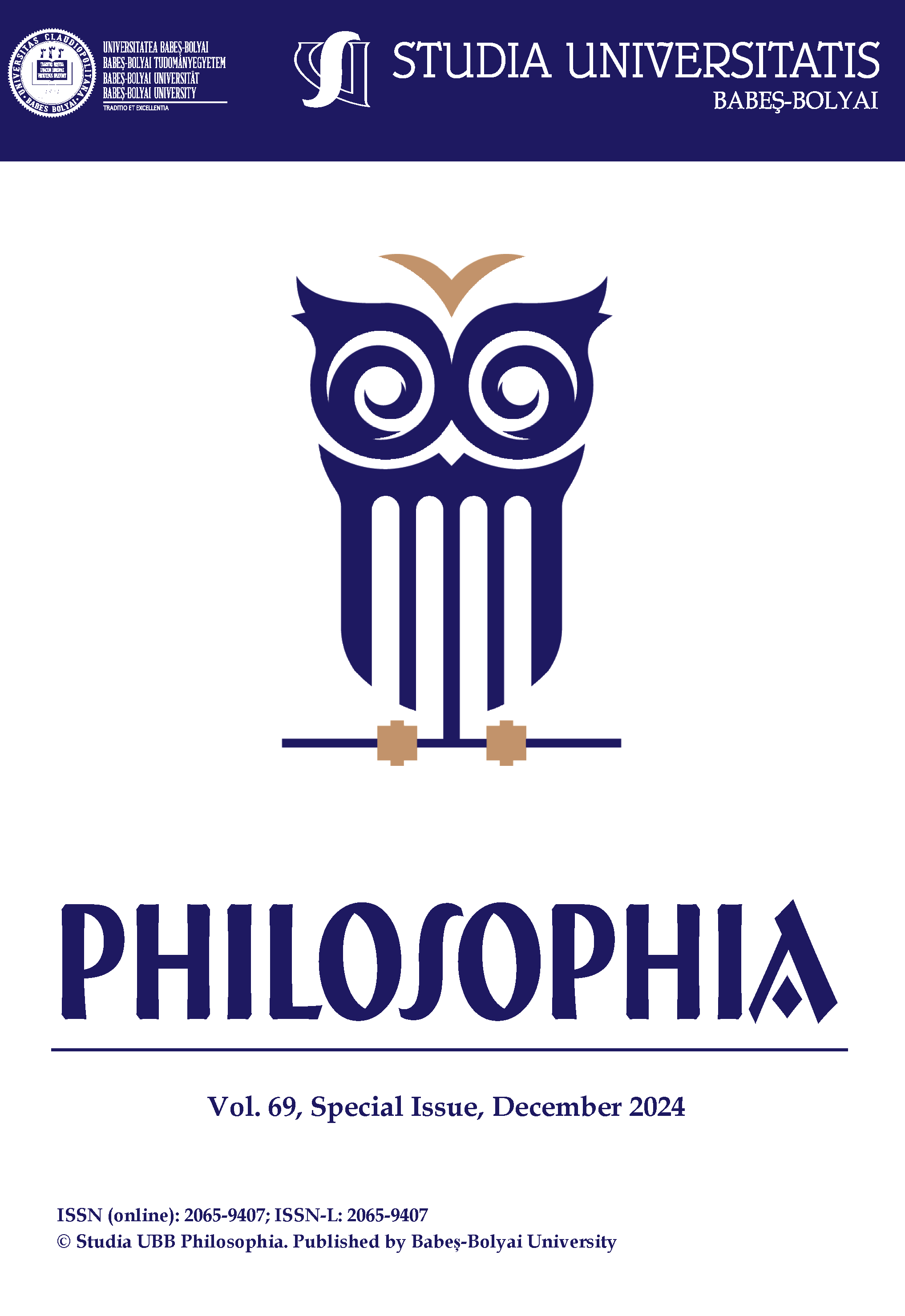Was Aristotle a non-classical logician?
DOI:
https://doi.org/10.24193/subbphil.2024.sp.iss.06Keywords:
history of logic, logical system, syllogistic, paraconsistent logics, connexive logicsAbstract
This paper discusses the possible classification of Aristotle’s syllogistic as a non-classical logical system, positing Aristotle himself as a non-classical logician. Initially, we find compelling arguments for this thesis, particularly regarding the expressive power and the rules governing logical inference inherent in Aristotle’s approach. My analysis nevertheless addresses two significant counterarguments. The first, the special case objection, posits that Aristotle’s syllogistic can be framed as a classical logic which deals with canonical syllogistic forms. I argue that this objection is insufficient, as it is possible to point cases in which his system seems to differ from classical logic. The second counterargument, the formalisation gap objection, highlights that Aristotle’s syllogistic resists straightforward modern logical interpretations. This latter objection is evaluated as more compelling and substantial. In particular, a distinction between two concepts is proposed which could help us understand what Aristotle was aiming at in his theory of inference: the notions of ‘to follow from’ and ‘to be a conclusion of’. While the former aligns with the usual sense formal validity, the second requires an inferential structure connecting the premises to the conclusion, explaining why Aristotle excluded inferences like from A ⊢ A syllogisms despite acknowledging that A follows from A.
References
1. Aristotle. Organon. Testo Greco a Fronte (ed. by Mauriizio Migliori and transl. by Lucia Palpacelli), Bompiani, 2016.
2. Ayda I. Arruda, ‘A survey of paraconsistent logic’, in Ayda I. Arruda, Rolando Chuaqui, and Newton C. A. da Costa (eds.), Mathematical Logic in Latin America: Proceedings of the IV Latin American Symposium on Mathematical Logic, Elsevier, 1980, pp. 1–41. https://doi.org/10.1016/S0049-237X(09)70477-X.
3. Béziau, Jean-Yves. ‘Is modern logic non-Aristotelian?’, in Vladimir Markin and Dmitry Zaitsev (eds.), The Logical Legacy of Nikolai Vasiliev and Modern Logic, Springer, 2017, pp. 19–41. https://doi.org/10.1007/978-3-319-66162-9_3.
4. Boole, George. The Mathematical Analysis of Logic. Being an Essay Towards a Calculus of Deductive Reasoning, Philosophical Library, 1847.
5. Crivelli, Paolo, ‘Aristotle’s logic’, in Christopher Shields (ed.), The Oxford Handbook of Aristotle, Oxford University Press, 2012, pp. 113–49. https://doi.org/10.1093/oxfordhb/9780195187489.013.0006.
6. da Costa, Newton C. A., and Bueno, Otávio, ‘Paraconsistência: Esboço de uma interpretação’, in Newton C. A. da Costa, Jean-Yves Béziau, and Otávio Bueno, Elementos da Teoria Paraconsistente de Conjuntos, CLE, 1998, pp. 113–50.
7. De Morgan, Augustus, Formal Logic. Or, the Calculus of Inference, Necessary and Probable, Taylor & Walton, 1847.
8. Dunning, David E. ‘George Boole and the “pure analysis” of the syllogism’, in Lukas M. Verburgt and Matteo Cosci (eds.), Aristotle’s Syllogism and the Creation of Modern Logic: Between Tradition and Innovation, 1820s–1930s, Bloomsbury, 2023, pp. 73–91.
9. Dutilh Novaes, Catarina, ‘The different ways in which logic is (said to be) formal’, in History and Philosophy of Logic 32, 4/2011, pp. 303–32. https://doi.org/10.1080/01445340.2011.555505.
10. Gomes, Evandro Luís, and D’Ottaviano, Itala M. L., ‘Aristotle’s theory of deduction and paraconsistency’, in Principia: An International Journal of Epistemology 14, no. 1/2010, pp. 71–97. https://doi.org/10.5007/1808-1711.2010v14n1p71.
11. Gomes, Evandro Luís, and D’Ottaviano, Itala M. L., Para além das Colunas de Hércules: Uma história da paraconsistência: de Heráclito a Newton da Costa, Unicamp, 2017.
12. Haack, Susan, Philosophy of Logics, Cambridge University Press, 1978.
13. Kneale, William C., and Kneale, Martha. The Development of Logic, Clarendon Press, 1962.
14. Lukasiewicz, Jan, Aristotle’s Syllogistic. From the Standpoint of Modern Formal Logic, Clarendon Press, 1957.
15. MacFarlane, John, ‘What does it mean to say that logic is formal?’, PhD Dissertation, University of Pittsburgh, 2000.
16. McCall, Storrs, ‘A history of connexivity’, in Dov M. Gabbay, Francis Jeffry Pelletier, and John Woods (eds.), Handbook of the History of Logic, Vol. 11, Logic: A History of its Central Concepts, North-Holland, 2012, pp. 415–49. https://doi.org/10.1016/B978-0-444-52937-4.50008-3.
17. Miró Quesada C., Francisco, ‘Las lógicas heterodoxas y el problema de la unidad de la lógica’, in Diógenes Rosales Papa (ed.), Lógica. Aspectos Formales y Filosóficos, PUCP, 1978, pp. 13–44.
18. Miró Quesada C., Francisco, ‘In the name of paraconsistency’ (transl. and annot. by Luis F. Bartolo Alegre), in South American Journal Logic 6, no. 2/2020:163–71. http://www.sa-logic.org/sajl-62.html.
19. Omori, Hitoshi, and Wansing, Heinrich, ‘Connexive logics. An overview and current trends’, in Logic and Logical Philosophy 28, 3/2019, pp. 371–87. https://doi.org/10.12775/LLP.2019.026.
20. Plato, Werke in Acht Bänden, Griechisch und Deutsch, Vol. 3, Phaidon, Symposion (Das Gastmahl), Kratylos (ed. by Gunther Eigler and transl. by Friedrich Schleiermacher), WBG, 1977.
21. Priest, Graham, ‘Paraconsistency and dialetheism’, in Dov M. Gabbay and John Woods (eds.), Handbook of the History of Logic, Vol. 8, The Many Valued and Nonmonotonic Turn in Logic, North-Holland, 2007, pp. 129–204. https://doi.org/10.1016/S1874-5857(07)80006-9.
22. Priest, Graham, and Routley, Richard (eds.), Paraconsistent Logics, Special issue of Studia Logica 43, no. 1–2/1984.
23. Priest, Graham, Tanaka, Koji, and Weber, Zach, ‘Paraconsistent logic’, in Edward N. Zalta (ed.), The Stanford Encyclopedia of Philosophy, Spring 2022 Edition. https://plato.stanford.edu/archives/spr2022/entries/logic-paraconsistent.
24. Shin, Sun-Joo. ‘Logic of relations by De Morgan and Peirce: A case study for the refinement of syllogism’, in Lukas M. Verburgt and Matteo Cosci (eds.), Aristotle’s Syllogism and the Creation of Modern Logic: Between Tradition and Innovation, 1820s–1930s, Bloomsbury, 2023, pp. 93–111.
25. Verburgt, Lukas M. and Cosci, Matteo (eds.), Aristotle’s Syllogism and the Creation of Modern Logic: Between Tradition and Innovation, 1820s–1930s, Bloomsbury, 2023.
26. Wansing, Heinrich, ‘Connexive logic’, in Edward N. Zalta & Uri Nodelman (eds.), The Stanford Encyclopedia of Philosophy, Summer 2023 Edition. https://plato.stanford.edu/archives/sum2023/entries/logic-connexive.
27. Wengert, R. G., ‘Schematizing De Morgan’s argument’, in Notre Dame Journal of Formal Logic 15, no. 1/1974, pp. 165–6. https://doi.org/10.1305/ndjfl/1093891210.
Downloads
Published
How to Cite
Issue
Section
License
Copyright (c) 2024 Studia Universitatis Babeș-Bolyai Philosophia

This work is licensed under a Creative Commons Attribution-NonCommercial-NoDerivatives 4.0 International License.



